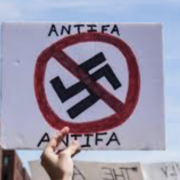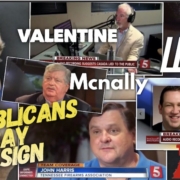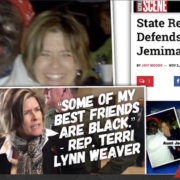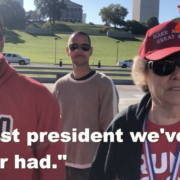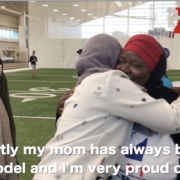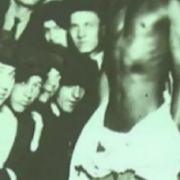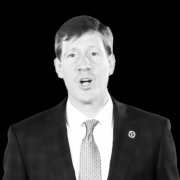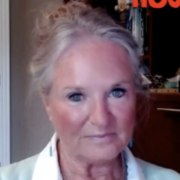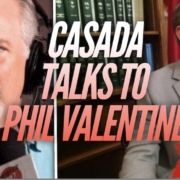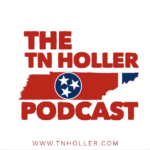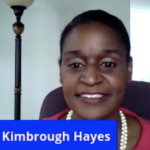INTERVIEW: ATLANTA ANTIFA SPEAKS
The president has just attempted to declare Antifa a terrorist organization, and there has been a concerted effort by conservatives to blame the social upheaval we’re seeing on Antifa to distract from the real issues of police brutality and white supremacy.
There have been many videos of white people dressed in black causing destruction, but we’ve also seen that white supremacists are doing the same in an effort to pin the blame on Antifa… so where does the truth lie? What is Antifa exactly?
In an effort to hear from Antifa directly, we reached out to Atlanta Antifa on Twitter, and they responded and were kind enough to talk to us. This is what they had to say.
—-
HOLLER: My first question is, what is Antifa?
Atlanta Antifa: “Well I think at this point it’s a rapidly evolving word and it’s used in two ways, one is just generically anti-fascist. Anybody who doesn’t like Nazis. So in that definition, there is there’s a lot of people who say people who fought in World War II were Antifa, and you know in a certain perspective that’s totally true, but it’s also used in a more specific way to talk about the groups that rose out of the old anti-racist actions from the 80s and 90s which were specifically designed to fight the far right, to monitor and counter KKK, Nazis, racist boneheads…. and then in the modern era, the alt-right. So our group is part of that more specific meaning of the word Antifa and we consider ourselves to be in that tradition. It’s an international movement to monitor and counter the far-right.“
HOLLER: And when you say our group, who is our group?
Atlanta Antifa: “Atlanta Anti-Fascists.”
HOLLER: How much coordination is there among Antifa groups in America?
Atlanta Antifa: “I would say we have a lot of coordination in terms of information sharing because really the vast majority of the work we do is monitoring, using open source intelligence. We will try to doxx Nazis and uncover their plans, de-platform them, so we share a lot of information, frequently publicly, in a decentralized way. We have no hierarchy, so there’s no leader of Antifa, groups don’t use real names, we tend to use a lot of information security because the Nazis are after us you know like the Base Plot for example, when they tried to assassinate two people they thought were our members, so we use a lot of security in order to keep ourselves safe because the people that we are after are pretty violent.”
HOLLER: So how did it start if there’s no hierarchy?
Atlanta Antifa: “I would say that while being an anarchist is not a prerequisite for entry, the group is fairly non-ideological when it comes to that, the dominant culture comes out of the anarchist political tradition in which you don’t want to have a strong structure or hierarchy because that a lot of times leads to abuse, so instead, folks contribute what they can. They do what they can and coordinate that way and operate by consensus and voting, and not “you do this, here and now.” We have coordination, but we don’t have hierarchy and leadership.”
HOLLER: Is violence a part of what you do?
Atlanta Antifa: “The vast majority of the time, no. Something like 99% of what we do is nonviolent. But, at the same time if it comes to that, we are definitely prepared to do that and we would not condemn it. I’m talking about stuff that Antifa, does encountering Nazis. For example, the protest in Newnan where there was a possibility of something like that happening but it was a community defense situation, it would have been defending AGAINST Nazis. So that’s pretty much the area where violence comes in. I would say our philosophy is we comment combat racism and fascism by any means necessary but almost all of the time those means are not violent.“
HOLLER: So, I’m assuming you’re seeing what’s happening in the country right now…
Atlanta Antifa: “Yes.”
HOLLER: “…And there’s been a concerted effort by Republicans, the President, the right-wing, Fox News, and all the way down the line to state and local legislators on the right, to essentially lay this at the feet, in large part, of Antifa. What do you think when you see that?”
Atlanta Antifa: “Well it’s sort of a wary disappointment because it feels like this has all been done before. It’s damaging I think because a lot of what is happening this weekend is a black-led reaction to white racist police violence and it shouldn’t really be about us. Although we are definitely very against racist beliefs, we are not planning or coordinating any of this. We are just supporting it. We are a small group, so our support mainly comes from monitoring these protests and trying to keep an eye out if any Nazis and far-right militia members are showing up so that we can warn people. That’s what we see as our function, but we have been sort of cast in the central role as the villain when we’re not even on the stage, let’s just put it that way. And it echoes back to the 1950s and 60s when racists were trying to discount the Civil Rights Movement which was led by black people they would say oh “they’re being puppeted by white Communists, it’s all outside agitators,” and I feel like people are reaching for that same playbook again and using us in order to discredit this other group. The other thing I want to say is that it’s dangerous because it encourages law enforcement to just crack down so much harder on people who are just trying to defend themselves against racists in their communities and these people may not have any connection at all to our group, which is a very specialized group in this tradition that I’m talking about going back to the 1980s, but anybody who says Nazis are bad now could be “ANTIFA” and will get cracked down harder on by police and law enforcement.”
HOLLER: Right, meanwhile though there are videos all over the place of white people just dressed in all black running around being destructive, and we as the public have come to recognize mostly white people dressed in all black as Antifa. We’ve seen pictures of white supremacists dressing up as Antifa to create this narrative, but is it possible that there are actually people who consider themselves Antifa who are doing this?
Atlanta Antifa: “Well, the situation is very chaotic and confusing, and the fact that there are white people causing damage, sometimes white people causing damage is it even political, like if you look at all these riots that happen after football. I think right now there’s a lot of different stuff happening and people do not want to examine the situation it is complexity, so they picked a very simple narrative, and the narrative a lot of people have picked are that we are the villain. I will say that that’s really our number one thing, is that we are trying to monitor any far-right people who have shown up at these protests that we can warn other protesters and track them, but it’s difficult because sometimes people hide their identities. We do think that sometimes the participation of white supremacists has been overstated though.”
HOLLER: So you’re involved with communication right? There’s something called The Torch Network?
Atlanta Antifa: “Well, The Torch Network is just a loose affiliation of some Antifa groups such as us, Portland, and so on. It’s an information-sharing network connecting the larger groups. There a lot of Antifa groups that are not members of The Torch Network. But the thing to understand is it’s totally decentralized and autonomous, so anybody can say that they’re Antifa, and anybody can say that they’re not Antifa. So the fact that somebody who is white and wearing all black and is destroying something doesn’t necessarily mean that it’s “Antifa.”
HOLLER: So you are involved in the communication theoretically of whatever this the closest thing to the centralized communication that there is. Is the goal to go out there and cause chaos or is it the opposite?
Atlanta Antifa: “It’s neither. We have no goal, actually. When it comes to this protest, we basically we support any black-led rebellion against racist policing, let’s just put it that way. We support, it but we don’t have a role in controlling it, and if we could then we wouldn’t because we don’t think that’s our role. I know that the popular that perception is, that Antifa is all white, but that’s actually not the case. People who are involved in these Antifa groups all stay anonymous because we don’t want Nazis trying to kill us, and there are definitely members of Antifa who are not white, but those members tend to stay even more anonymous because they get even more negative attention.
When it comes to the riots, I keep saying this but it’s totally true – if you talk to these other groups they’ll say the same thing, that we are not planning this. We are not saying okay this is the goal and go do it. When groups are coming together and they’re tearing down Confederate statues or making the police retreat, we’re going to cheer that on because we believe that that’s a good thing, against fighting racism and fascism, but we are not coordinating this. We are not the Puppet Masters.”
HOLLER: Right, so now the President has essentially said that they’re going to declare Antifa as a terrorist organization. How do you feel about that?
Atlanta Antifa: “Well you know like I said at the beginning, we’re kind of used to it at this point because he made the same threats last summer. We’re not sure if it’s even legal or Constitutional for him to do that, although I’m sure it will result in an increased law enforcement presence, but you know like I said, most of the stuff that we do is completely legal and covered under the First Amendment anyway. We think that the crackdown that will result will probably not affect groups like ours, although it may affect our social media and things like that, but it won’t affect us as much as it will affect every day just regular people who are accused of being our members.”
HOLLER: Right, so now they can declare anybody Antifa and treat them as terrorists.
Atlanta Antifa: “Yes, exactly, in his supporters already think that they can do that. They’re all saying “you’re going to be dragged off to GTMO,” and having all these fantasies of violent retribution.”
HOLLER: “We had a courthouse burned here, and they caught a guy who seems to have been involved. There was also a guy in all black right in front of him, and immediately the narrative was “oh he’s Antifa.” Fox Nashville came out and said that with zero proof of it. Meanwhile, he had what looked to be a white supremacist tattoo, and he’s from Nashville and has done other stuff here. When that happens is there any communication among you all to say that he was or wasn’t one of ours? Is there any way to validate or invalidate those kinds of claims?:
Atlanta Antifa: “Well, we’re all about transparent communication and public service, so if I knew anything about that case that was helpful I would say it, but I don’t.”
HOLLER: Gotcha, mean I wasn’t expecting that you knew anything about that case, I was Just saying is your group of where that that happened, and is there any communication among you saying does anybody know this guy or has anybody heard of this guy that kind of thing?
Atlanta Antifa: “No.”
HOLLER: Is there any desire on the part of Antifa to control the narrative?
Atlanta Antifa: “We really can’t control the narrative because the nation has gotten so polarized at this point that the right-wing believes what they want to believe, and in many cases the mainstream media is taking their cues from the right. All we can do is just say the truth and hope people will pick up on it. Our business is not to go around avowing or disavowing all these different actions that are taking place this week, we’re just we’re not focused on that.”
HOLLER: Got it. I think people will be interested to have heard from you, so is there any message that you have either for people who are supporting the feelings black people are having, or for those who are trying to blame you like the president? Is there anything that you want to say?
Atlanta Antifa: “I think that we have to take care of each other, do a lot of mutual aid, support each other, and listen to each other. But that kind of listening and process it has to start from the bottom up. It can’t go from the top down. We have to listen to the people who are the most hurt, and the most powerless in society, and not go the other direction.”
HOLLER: All right well I appreciate you doing this and be careful out there.
Thanks for reading! We’re an independent, reader-supported site that depends entirely on you to help us keep holding our public officials accountable and “Yelling the Truth”, so please consider chipping in a $3, $5, or $10 monthly and we’ll keep telling the stories nobody else will:

